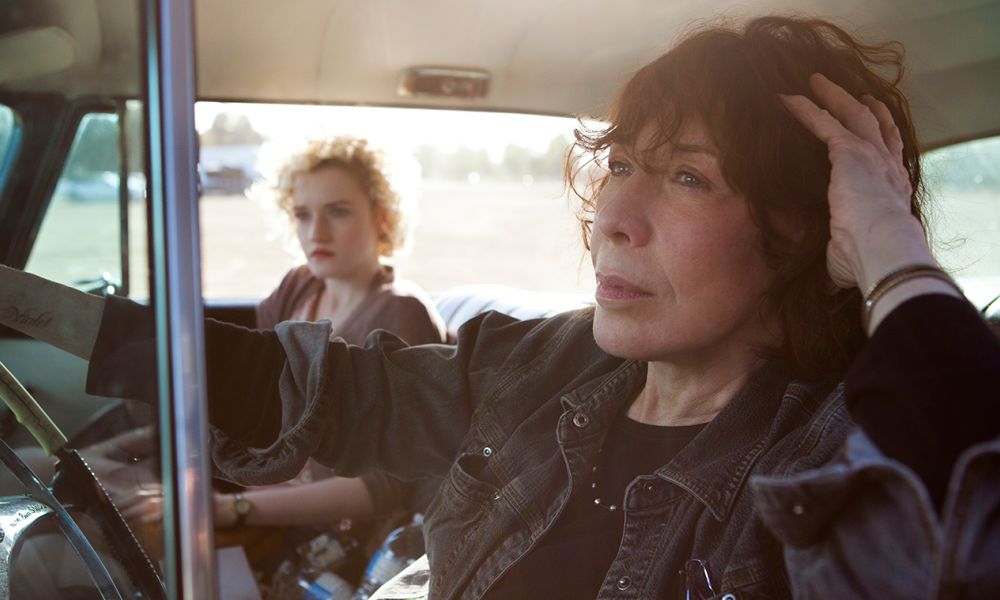 (4 / 5)
(4 / 5)
“Where can you get a reasonably priced abortion in this town?”
Elle Reid is not your run-of-the-mill septugenarian. With her mane of dark hair and her acerbic wit, she’d look more at home at a ‘60s campus demonstration than a retirement community. An academic by trade, feminist, poet, and self-proclaimed misanthrope, she lives in an adobe one-story decorated with a wind chime made of cut-up credit cards.
Having broken up with her much younger girlfriend mere hours before, Elle is visited by her eighteen-year-old granddaughter, Sage, who reveals that she’s in need of $630 for an abortion. With less than fifty bucks between them and only half a day till Sage’s appointment, they hit the road in a black ’55 Dodge Royal Lancer to call on a variety of Elle’s friends and lovers in order to make up the difference.
The film’s title, Grandma, and the Eileen Myles quote that opens it — “Time passes. That’s for sure.” — are somewhat misleading in this context. Elle is no more defined by being a grandmother than she is by her sexuality, but rather a complex, fully-rounded figure.
Grandma is less About Schmidt than it is a generation gap Thelma & Louise; the story of two women, one assertive, the other shy, who undergo a journey together in the form of a road trip, albeit here a road trip that takes place entirely within the confines of Los Angeles, with less driving off cliffs and more commotions in coffeehouses. “All coffee is drip!”, Elle rants – not entirely accurately – at a passive-aggressive barista who decides a conversation about abortion is reason enough to ask them to leave.
Written and directed by Paul Weitz, one half of the brother duo behind American Pie and About a Boy, Grandma may be the closest thing the dramedy genre has to a truly feminist text. Not only does it pay to lip service to key figures like Betty Friedan, author of The Feminine Mystique, but it kicks the Bechdel Test up and down the park.
While Tomlin’s Elle is undoubtedly the star, and reason for the film’s existence — rude, stubborn, but empathetic — Grandma serves as a showcase for some of the greatest female talents (see: talent full stop) working in film today. Julia Garner, for instance, holds her own as the timid, frizzy-haired Sage while Marcia Gay Harden finds a guarded vulnerability as uptight executive/mother-daughter Judy.
Also finding time for Laverne Cox as a charismatic tattoo artist, Grandma more or less dispenses with male characters; apart from the aforementioned barista (played by John Cho), Sage’s creep of a boyfriend, Cam (a truly loathsome Nat Wolff), and, most memorably, Sam Elliott as Karl, a mellow, rangy divorcee with whom Elle has a mysterious history.
Weitz’s script is both witty and profound, keeping the energy up while never making light of the issues on display. The scene between Tomlin and Elliott as they unpack their grievances over a joint is one of the highlights of the year. Grandma’s opening — the breakup between Elle and Olivia (an as-always resplendent Judy Greer — pounds with exposition, but once the film finds its rhythm there’s no stopping it.
Shot in just nineteen days, and on a shoestring budget — that’s Tomlin’s own car she’s driving — Grandma is a cinematic tour de force that reassures it’s star’s status as a national treasure. This is for her what The Lady in the Van is for Dame Maggie Smith; namely a perfect vehicle for her talents.
After callously telling Olivia that their relationship means nothing to her after her loss of her long-term partner, the absent “Aunt Vi”, Elle finally breaks down in the shower. Afterwards, standing before the bathroom mirror, Elle continues to weep before gritting her teeth and snarling, laughing at her own pain.
Able to shift from comedy to tragedy and back again in a moment, Grandma seizes upon the bitter-sweetness of life. The nominations should be in the post.
